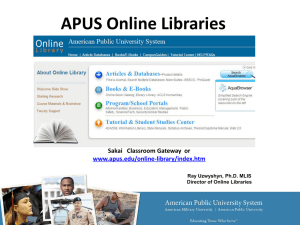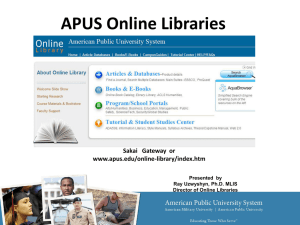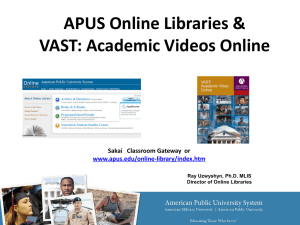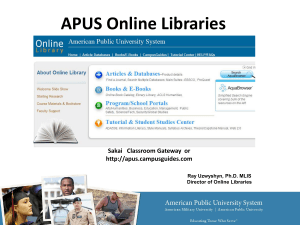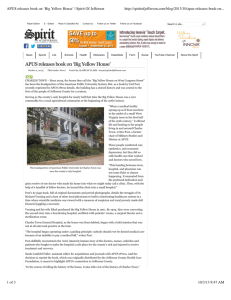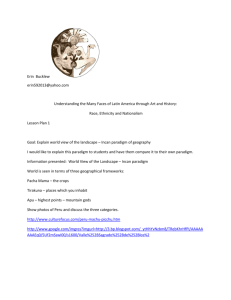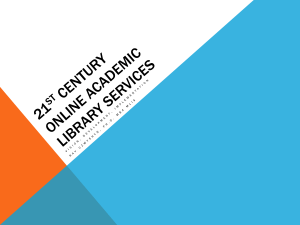Your Guide to SUCCESS! - American Public University System
advertisement
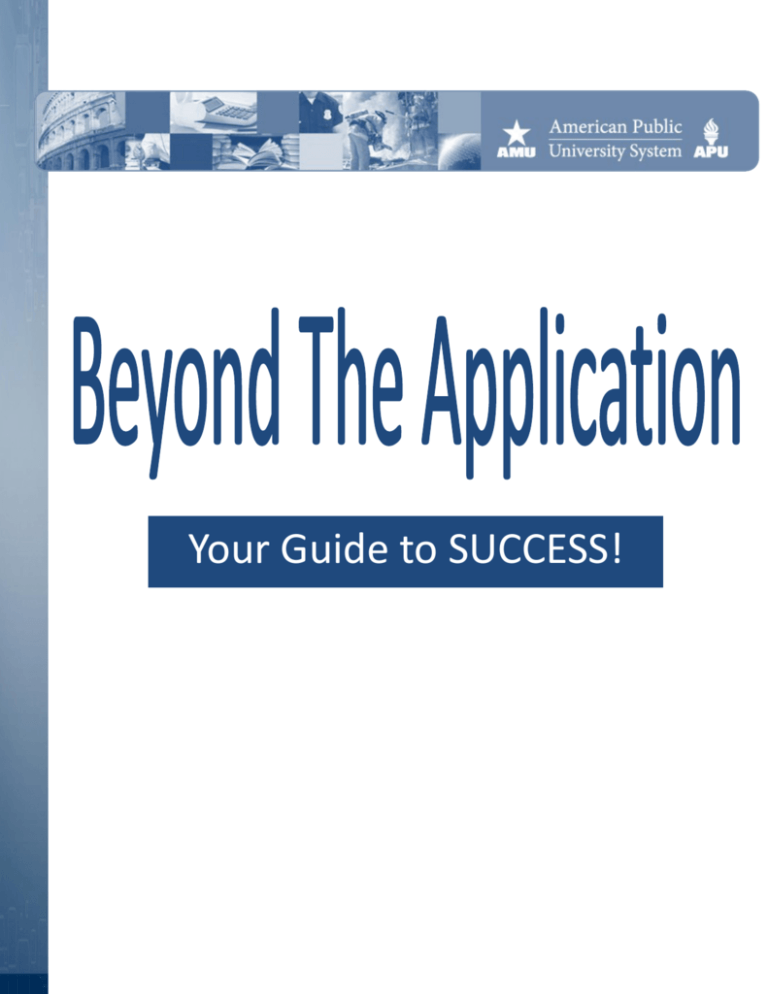
Your Guide to SUCCESS! Welcome!! The Admissions Team at American Public University System (APUS), home of American Military University and American Public University, understands how challenging it can be to balance work and other commitments while pursuing your college education. We created this guide as a useful tool to help you get off to a good start. Enrollment at APUS is designed to be a simple, smooth experience. We understand the value of your time and, with that in mind, designed the enrollment and registration processes to be completed quickly and easily online. You do not have to wait for our office to be open to find the information you need to succeed. No matter your location or time zone, you can use the resources and information provided in this guide to find the answers you need. Should you have questions or need assistance, please reach out to us. We are here to assist you by phone, email and chat Monday thru Thursday from 8am to 7pm ET, and from 9am to 4pm ET, on Friday. Since our students are located in various time zones and locations, our main method of communication is email, and we strive to respond to inquiries within 24 to 48 hours. Please reach out to us via email should our office hours not meet your immediate need. Admissions Contact Information Hours of Operation: Contact Us: Monday - Thursday: 8am– 7pm ET Phone: 877-755-2787 Friday: 9am-4pm ET Email: info@apus.edu Live Chat 2 Table of Contents What’s Online Learning Like? How Can I Prepare for Success? The Transition to Online Learning Learning the Online Classroom Knowing your Ecampus Using the APUS Library Are There Resources to Help Me? “Things I wish I had known” - Advice from Successful Students Who’s Who: APUS Department Directory 3 What’s Online Learning Like? If you’re accustomed to taking classes in a traditional classroom environment you’ll have to adjust to doing not only all your assignments in writing, but almost all your communication as well. The participation requirements that you’d normally have in a classroom will be fulfilled in weekly written forum posts where you’ll write about a given topic and then respond to your classmates’ posts. Since everyone logs into the classroom at different times there will be no “live” forum discussions as you’d have in a traditional classroom. In most cases your forum posts will be similar to very short essays and may even require sources and citations; just like you’d expect in an academic paper. Depending on the academic discipline of your class, there will be a specific citation style that your instructor directs you to use in all your writing. You can go here for an overview of the main styles and the academic disciplines in which they’re used. Some of our classes, primarily COLL100 Foundations of Online Learning and ENGL101 Proficiency in Writing, will focus on helping you learn to write in the appropriate style. In addition to the forums with your fellow classmates, you will be communicating with your instructors by messages inside the classroom. If you have questions or need assistance with anything in a particular class, the instructor should be your first resource. You shouldn’t wait until the day an assignment is due to ask a question about it because responses are not always immediate. Instructors should respond to messages within 48 hours. If you run into any problems that prevent you from completing coursework, like a family emergency, sickness or computer issues, you should make every effort to contact your instructors as soon as possible, ideally before you miss turning in any assignments. Similarly, if you’re struggling in a class, please ask the instructor for help early on in the course, rather than waiting until later in the course. We are all here to help, but only know when you need it if you tell us. 4 OMG! LOL. BRB. TY. YW. These common acronyms might be the new language for texting and social media, but communication at the college level is expected to be much more polished than that. We don’t want to stifle your creative spirit or personality, but students must learn to express themselves well in writing. You will have many writing assignments, expanding from the more casual forum postings to full-blown research papers and projects. You will be expected to use complete sentences, correct grammar and punctuation in all your coursework. In most programs and classes instructors will outline a specific style of writing that you must follow. Whether it’s MLA, APA, Chicago, Turabian, etc., each style dictates how the information you have gathered is to be presented. Always refer to your syllabus and other material available inside the classroom for guidance. One of the most important aspects of being a successful online learner is reading. Not just reading from your course materials, but carefully reading each email and posting sent your way. Unfortunately, it’s not uncommon to hear from students that they never knew “xyz” even though information was sent to them about “xyz” via email. You don’t need to be glued to your smartphone or netbook every minute of the day, but we don’t want you to miss any important information from us either. We try to send short messages so as to not take up anymore of your time than necessary, but you will receive longer emails occasionally. Since you are taking classes online, the majority of the communications you will receive will be via email. It is vitally important that you carefully read the information sent to you, whether in or out of the classroom. Detailed instructions on next steps will be sent regularly from your admissions representative, academic advisor, instructors and others. To ensure that you receive our email communications, we highly recommend that you add us as a trusted sender in your email profile. We have also noticed that students with yahoo.com email addresses do not always receive our communication. If you currently use a yahoo email, you may want to consider creating a new email through another no-cost provider. 5 How Can I Prepare for Success? Managing Time Good time management skills are absolutely essential when attending an online university. The first step is finding out what works for you as a student. Some students may be able to stop and start a project with relative ease; others may feel more comfortable working on an assignment for a longer stretch at a time. Every student is different. Honoring your own method will save you time and frustration. Once you decide on what time management methods work for you as a student, you will need to determine how much time is available to complete your studies. Taking a few days or weeks to journal your normal daily activities by half hour increments is a helpful tool. Then you can determine when to study during the week; perhaps during your lunch break at work or in the evening at home. This will be different for each student depending on professional and personal obligations. Flexibility is important too. Things change from week to week and month to month. Scheduling for a few unforeseen circumstances will help you avoid being overwhelmed when life happens. Setting Goals Which program should you enter? What order should you take courses? How many courses should you take at a time? Starting school and finishing your program can be a daunting task. It helps to set small and large goals. Obviously, you’ve accomplished your first goal of “enrolling in a program,” but there are many goals you will set and reach along the way to graduation. The goal of finishing your degree is a good one, but care should be taken to set realistic goals. For example, “My goal is to finish 12 courses in one year.” This is a short term realistic goal that will lead you to your long term goal. “My plan is to finish all of the courses for my Bachelor Degree in 1 year,” for example, is not a realistic goal and trying to achieve it may result in frustration. Even smaller goals will be useful, such as setting goals inside a particular course. “I will find two references every week for my final paper” would be a good one and will allow you to accomplish smaller tasks in preparation for the final goal of “writing an incredible research paper.” What are some of your long term and short term goals? 6 Planning Ahead Just because you are attending an online university doesn’t mean that you won’t come across scheduling issues. Planning ahead is your best course of action. Vacations are great and much deserved but if you’re taking courses year round you’re bound to have a getaway planned during a class. There are things you can do to minimize this conflict. One option is to schedule what you can for the brief week between classes (when there is one). Obviously this won’t always be an option so referring to your syllabus can help you gauge which weeks will be better suited for scheduling additional events. When the syllabus can’t help, your instructor may be able to assist you. Reach out to your teacher for advice on what you can work on early so that you will have more time during busy weeks for other obligations. Occasionally there’s no way we can change or manage schedule conflicts. That’s when the flexibility of our courses is helpful. We have classes starting the first Monday of each month. Most students can take time off between classes if need be. If you are using Federal Student Aid, please contact a Financial Services Specialist to confirm that taking time off won’t affect your funding. Planning ahead goes beyond vacations and appointments. There are a lot of life experiences that can be planned for. Keep this in mind when you schedule your classes and communicate with your instructors. Pacing Yourself In today’s fast-paced world, we live in the here and now; we want what we want when we want it. When it comes to fulfilling your educational goals with APUS, we want you to retrain your way of thinking. When registering for courses keep in mind your schedule (i.e. work, kids, volunteer) and enroll in courses in a way that will promote your success. Once in your course, evaluate all assignments and pay close attention to when they are due. Set aside time daily for course work; cramming everything in on the day the assignment is due can lead to unneeded stress and burnout. You should also note that you have up to 7 years to complete your associate degree, up to 10 years to complete your bachelor’s degree and up to 7 years to complete your master’s degree. To help manage your work load, we have outlined the expected number of hours each week you will spend on your course work. Expect up to 15-18 hours of study time per week for an 8 week undergraduate course Expect up to 10 hours for a 16 week undergraduate course Expect up to 10-15 hours of study time for a 16 week graduate course Expect up to 18-22 hours for an 8 week graduate course. 7 The Transition to Online Learning Congratulations on your recent decision to further your education! By choosing to pursue your degree at APUS, you have joined a tight-knit community of students, staff and faculty who are dedicated to lifelong learning, and committed to student success. As a new online student it is important to understand that ups and downs will occur as you progress through your enrollment and degree program. For most new students, starting college is a very exciting, sometimes even nerve-wracking experience, and for online students, in the unfamiliar environment of distance learning, even more so. Transitioning into any new culture comes with its highs and lows, and research suggests that college students experience these in a rather predictable pattern of stages. Most students go through a process known as the “W-Curve” when making the transition into college. The W-Curve theory identifies the ups and downs students typically experience when pursuing their education. As you prepare to embark on your educational journey with APUS we hope that understanding the various stages of the W-Curve will help make your transition into higher education easier and more successful. The W-Curve, as suggested by Zeller & Mosier (1993), was traditionally applied to first-year college students entering into university culture in a traditional campus setting . The stages, illustrated in the graphic below, outline the ups and downs students typically experience when beginning their college experience. Although most of the research surrounding the W-Curve is based on the traditional college student, as distance learners at APUS, we believe that these stages can also be applied to you - the online adult learner. So what are these stages and why should you care about them? 8 HONEYMOON The “honeymoon” stage occurs when you make the decision to accomplish your goal of pursuing higher education. The excitement of a new beginning and the possibilities for the future are “top of mind” during the initial admission and enrollment processes. You complete your application, get accepted to the university, and begin preparation to start your first set of online courses. However, doubt may start to creep into your mind and fears may begin to develop once the newness of this adventure begins to fade and the processes of applying for financial aid and getting transfer credits evaluated become a reality. But don’t worry – this feeling is perfectly normal and will pass. Your Admissions Representative will be there to help if you run into any problems; just send an email or pick up the phone. CULTURE SHOCK “Culture shock” in the online learning environment starts to develop at different times for different people. However, the fears are generally the same; fear of failure, sense of being alone, or the fear of an unfamiliar classroom structure. These doubts are common for students, especially those new to the distance learning environment; but there is support at APUS to help you get through this stage and move on to the next. At this point, you should be fully engaged with your APUS Admissions Representative who can help alleviate any fear or doubt that you may have about online learning. You can also take advantage of resources offered to you, such as Virtual Open Houses, Facebook communities and tutoring to ease your transition and build new relationships. INITIAL ADJUSTMENT Once you have successfully navigated the online environment and are actively engaged in a class or two, you will start to feel more comfortable and adjust to this new “culture”. APUS offers many opportunities to find mentors, join groups based on fields of study or hang out in the virtual “Student Lounge.” Successful students begin to actively participate in these virtual communities and have successfully identified people throughout the university to go to for support: admissions representatives, funding specialists, faculty, staff, academic advisors and fellow students. MENTAL ISOLATION The next stage in the W-Curve can occur at any point in your career at APUS. As an adult online student you are already well aware that “life happens”. Whether interruptions occur because of work, family, or academic challenges, hiccups are bound to happen. When issues arise, it is easy to slip into a state of mental isolation. “No one is here to help.” “No one understands my circumstance.” These may be thoughts that run through your head; but , keep in mind that those relationships you created in the adjustment phase still hold true and help is always available. The APUS Student Support Center can help you explore options and identify resources if you need assistance. ACCEPTANCE & INTEGRATION After the ups and downs of the initial four stages, there will come a time where you fully connect to the university, students, faculty, and staff. At this stage, you are a part of the University community and have made good progress toward completing your degree. You may, at this point, be able to visualize graduation and degree completion and feel a sense of achievement. Obstacles and challenges may still present themselves, but at this stage you are equipped with the knowledge, resources, relationships and confidence to continually move forward. 9 Knowing your Ecampus The APUS electronic campus, also called the ecampus, is the online equivalent to the many departments or buildings you might visit at a brick-and-mortar institution. Here you can access services with just a click of your mouse. To access your ecampus, log in as a current student on the AMU or APU homepage with your student ID and password. There’s a lot going on here, so let’s take a look at some of the main areas together. The progress bar at the top displays icons that indicate milestones in your admissions process and your progress toward completion. Registration Dates and Times to Remember shows the months open for registration and the registration deadlines for each session. It includes important dates such as payment due dates and course drop deadlines. Important Announcements provide students details on policy and news updates. The right side of your ecampus has clickable links to university resources. Academic Resources includes links to the APUS Library, where you can access a wide variety of course research materials and the tutorial center. The Center for Teaching and Learning has Student Resources, such as student publications, research strategies and in-depth information on the Sakai Classroom. The Student Services area helps you become part of the APUS student community. Click on the The Quad to access the Global Mentor Network, Student and Alumni Organizations, honor societies and more. The Graduate-level Books and Course Materials and Undergraduate-level Books and Course Materials links take you to the APUS official book store, where graduate students can buy books, and undergraduate students can confirm their book orders. The Student Handbook link takes you to your main resource on APUS policies. The Transfer Credit link takes you to a valuable resource for any student who will be transferring in prior credit. 10 The left side of your ecampus has clickable links that help you take care of academic business. The red Register Now button is a shortcut to your academic plan. Click on it to begin registering for classes. You can also find information about your advising team here. The grey Enter Classes button takes you to My Current Courses, which shows your course list, with an Enter Classroom button for each of your current courses. If payment has not been received for the course, you will see a notice listed below the course name. Click on the course title to get course material information. The My Personal Information area allows you to update your contact information. You must maintain valid contact information on file while you are a student at APUS. Be sure to update your email, shipping address, and phone number if you move around during your time here. The FORMS Menu lists the forms you use to begin your transfer credit evaluation process (TCE Application), order transcripts, change your academic program, drop/withdraw from courses, and other important processes. Click on OTHER FORMS to access the full list, including information on how to apply for the COLL100-Foundations of Online Learning waiver. The Records Menu provides links that let you check your student status and grades, access financial aid and account information and other details. My Academic Records contains the Document Log, which lists the documents required to complete your file and tracks their status. My Academic Plan lists the courses in your degree and helps you track your progress. Federal Student Aid gives you access to financial resources that you will need if you have applied for federal student aid. The Print Menu provides printer-friendly versions of your admissions letter, registration confirmations, and TCE form. The TCE form has links to the Transcript Release Authorization (TRA) form, which you will fax or email to us so we can request transcripts on your behalf from your previous schools. The Admissions Team invites you to an “Exploring the Ecampus” Virtual Open House you can attend via your computer; click here to register. 11 Learning the Online Classroom Is your course starting soon? If you are new to online learning or new to the Sakai classroom environment, here’s a quick rundown of 10 important areas in your e-classroom. You can access all of these areas by clicking on the title from the navigation bar on the left side of your classroom. First stop…Announcements Get in the habit of clicking on the Announcements link every time you enter your classroom. Your instructor may use it to post important information about assignments and forum postings. Second stop…Syllabus As soon as you log in to your classrooms for the first time, click on the Syllabus link. Your course syllabus includes such things as your instructor’s contact information, the weekly schedule of assignments, classroom policies, course materials, and grading scale. Most syllabi will be in Microsoft Word or Adobe PDF format, so you should be able to access them easily. It’s a good idea to print the syllabus out or save it to your desktop so you can check it regularly when you are not logged into your classroom. Third stop…Resources Instructors use this area to store documents and files that are intended to help you throughout the course. Be sure to click on the Resources link before beginning or completing any assignments. Fourth stop…Library The APUS library boasts more than 44,000 journal titles and more than 148,000 books and e-books. A Getting Started Video shows you a library overview and a Contact Us box provides you with many resources you may use for assistance as needed. Librarians have compiled subject-specific course guides to assist you in using the right research materials for your assignments. The library also provides access to other resources such as a tutorial and student studies center. 12 Fifth stop…Policy The Policy link provides policy information found in the Student Handbook, including dropping/withdrawing from a course, grading, extensions, plagiarism, and disability services. Sixth stop…Forums You’ll probably be going to the Forums link more than any other section of your e-classroom. Your instructor will use your responses in the Forums area to gauge your participation throughout the course. This is where your instructor posts the forum questions and where you post your responses to your instructors and to fellow students. Seventh stop…Assignments The Assignments link shows all of the assignments you need to complete throughout the course and the order in which you need to complete them. You can track your assignment’s status, which range from returned, submitted and not started. In some cases, APUS’ plagiarism detection software (Turnitin) will be integrated into this section. Eighth stop…Tests & Quizzes The Tests and Quizzes link gives you a breakdown of all the assessments you will need to take throughout the course. Some assessments may be timed or untimed, and you can check that in this section. Ninth stop…Messages The Messages link is an internal email box that enables you to communicate with your instructor and classmates. If you have a question or need to inform your instructor of something, send a message through this section. Tenth stop…Gradebook For each assignment, your grades will appear in your Gradebook link. This section will display your current grade based on the work you have submitted as well as a final grade once all the coursework is complete. Click on the graded assignment to view feedback from instructors. Don’t hesitate to click on and investigate all the links in your classroom. We invite you to participate in a live tour of the classroom via any of our “Exploring the Classroom” Virtual Open Houses; register by clicking here. 13 Using the APUS Library As a student at APUS, you can take advantage of all the resources in our library. It’s accessible via the APUS Library links in your ecampus and your classroom. The grey tabs you see above are located inside your ecampus. You can access the library by selecting the third tab. Many instructors will require you to use the library to complete homework assignments and research papers. The library has more than 150,000 items, including scholarly journals, electronic books, articles, and videos. Subject-area expert librarians are available around the clock, and they have compiled subject-specific and class-specific course guides designed to help you with your research needs. The library is also home to the Tutorial and Student Study center, which has a variety of useful features to ensure your academic success such as Tutor.com, an online writing lab, and the mini-math center. Take some time to familiarize yourself with the library and the research tools before you begin writing your paper. Browse through the virtual stacks and catalogs and explore! Here’s a summary of what you’ll find... The Getting Started link gives you access to a guided tour on the library. It provides a brief and helpful overview of all the library’s services. The Online Research section offers many resources to help you begin work on a paper. HELP/FAQs select theses links to type in questions for the librarian. This page also includes clickable links to areas around the library, commonly asked questions, and other resources. You can contact a librarian by emailing: librarian@apus.edu 14 ARTICLE & DATABASES The Articles and Databases section gives you access to extensive scholarly databases for journal, magazine, and newspaper articles; the library itself has multi-year runs of more than 58,000 journals. Two databases, Ebsco Suite and Proquest Suite, contain articles for a wide range of subjects, and there are smaller, special-topic databases with articles for areas such as psychology, criminal justice, and history. BOOKS & EBOOKS The Books and eBooks section gives you access to a growing collection of physical and electronic books. Currently numbering over 200,000, these holdings are focused on the University’s educational programs. You can search for a specific topic, save all relevant books to an easily accessible bookshelf, and then make notes and highlights for your research. RESEARCH GUIDES Under the Research Guides section, you are able to access a series of guides that provide useful information and resources for conducting research in specific subjects. Here, you can click on links to research the guides by school, by program and by course. RESOURCES & SERVICES Under Resources & Services, you are able to access the Student Academic Resource Center which provides style manuals as well as tutorials that show you how to use the library and how to write research papers. You can schedule an individualized tutoring session, visit the Math section, which provides instructional videos designed to reinforce classroom instruction, and visit the Writing Help section, which provides tips and guidelines for effective writing and research. Here you will also find a link to Turnitin, an application to help you avoid plagiarism. Some instructors will require you to use this application before submitting papers. 15 Are There Resources to Help Me? As a student, you may wonder where to go for assistance. APUS staff are available to assist you with registration, financing, and transferring credit. Other answers can also be found on our website, your ecampus and other publications. Your Admissions Representative is also happy to assist. Student Handbook This valuable resource can be found on the right side of your ecampus under the Student Services menu and under the Student Handbook tab at the top of your ecampus. The Student Handbook provides important information about APUS policies such as our grading system, course extension procedures and many other resources. You can also access the Student Handbook here. Syllabus Archives The syllabus archives, accessible in the library, are a useful tool to get an idea of a course’s content beyond what’s available in the course description. Keep in mind; however, that there is no guarantee that the current class will be taught this way. 1. Click on the grey APUS Library tab at the top of your electronic campus home page. 2. Hover over Course Materials and click on Archived Syllabus. 3. From this page, click on the subject under the level you are interested in (for example: Business, Undergraduate). Click on the course you are interested in and the syllabus will load. 16 STAR Center: Student Advising & Resource Center The Star Center is located on the right side of your ecampus under the Student Services menu. This link serves as a source of information when your advising team is not available. You can find answers to almost any question via the Advising Resources link on this page. University Directory Located at the top of the AMU or APU homepage, the About Us section offers you a link to the Contact Us section. This links you to our University Directory, where you can connect to many APUS departments including Student Support, Student Records, Transfer Credit, Advising, Registration, Graduations, Alumni Relations and Career Services. BUILDING RELATIONSHIPS As in other areas of life, it is highly important to have a support system to help you succeed when you’re in college. We want you to know that just because you are taking classes in the comfort of your home, you are never truly alone. We encourage all students to build relationships with their instructors, classmates and APUS staff members who are all working to help you achieve your goal of earning your degree. We encourage students to “like” us on Facebook and to visit The Quad. Social Media has become an important part of our culture and is a wonderful way for you to reach out to fellow students and share your experiences. The Quad, which you can access from the Student Services menu on the right side of your ecampus, is another way to connect to fellow students and alumni. The Quad houses the Global Mentor Network e-mentoring program, student organizations, general interest groups, an opt-in student and alumni directory and other services. After you set up an account on The Quad, you will have the opportunity to establish connections in some of the following ways. · Starting or finding blogs · Joining organizations · Sharing milestones such as births and adoptions, engagements and marriages and professional accomplishments · Becoming a mentor or mentee 17 “Things I wish I had known” - Advice from Successful Students “I wish I would have realized how much time management would come into play with online college courses. The flexibility of the courses affords a lot of opportunities to procrastinate, so it takes a lot of discipline to stay on top of assignments and not fall behind.” ~ Matt ~ Bachelor of Arts in Management “I can view the archived syllabus ahead of time which allows me to plan ahead for other commitments.” ~ Mary ~ Master of Psychology “I really wish that someone had told me to watch the open houses that the school offers, I watched some of the recorded ones and it helped a lot, especially the one for the Sakai classroom. Unfortunately, I struggled in the classroom a while before I finally watched it. You should definitely watch that before your start classes.” ~ Ammon ~ Bachelor of Science in Environmental Science “I wish someone had told me not to take COLL100 and ENGL101 together. That was a lot of writing.” ~ Cathy ~ Bachelor of Arts in English “Establishing a set time each week to devote to schoolwork is a key to success. Having a schedule already established really makes it more manageable to complete your work each week and not get behind. “ ~ Kristina ~ APU Graduate 18 “Print a copy of your syllabus and never hesitate to ask questions in the classroom!” ~ Emily ~ Bachelor of Arts in Management “Log in to your classroom the first or second day of each week to see that week’s assignments so you can get started on them early. Sometimes professors want the forum posting made mid-week to allow follow up postings to fellow students. “ ~ Hunter ~ Certificate - Graduate in K-12 Online Teaching Endorsement “As a student in the MBA program, I wish I would have realized the importance of the software that may come in the back of some of the text books. Especially in the statistics classes. They certainly make life much easier. Going back I would have utilized them from day 1.” ~ James ~ Master of Business Administration “I wish I had known that I might be asked to provide documents like my tax return, social security card, and other proof of identity. If I would have known the process was so self-driven, I would have been logging in everyday to check my status.” ~ Matt ~ Bachelor of Arts in Religion “The one thing that I wish I knew about is the Mini-Math Center when I was taking MATH110. It could have made me understand some of the algebra a bit better.” ~ Donald ~ Bachelor of Arts in Management 19 Who’s Who: APUS Department Directory There are plenty of resources available to students here, the real question is… “Who do you contact when?” Here’s a brief overview of the departments to help you know who to go to and when. Admissions – Our Admissions Team assists new students with general questions about the process of applying for admission and starting your first class. Admissions can assist you with submitting your Transfer Credit Evaluation (TCE) Application, registering for your first course, submitting forms like the COLL100 Waiver and Program Change Requests. Admissions is here to support you from the time you make your enrollment decision until you finish your first class, just contact your Admissions Representative by calling 877-755-2787 and selecting Option 2 or email info@apus.edu Student Support Center– This department is your go-to for any and all questions not otherwise specified after you finish your first course. They are our problem solvers. When you need help with course registration, course extension questions, transcripts, enrollment status or anything to do with course dates you can call Student Support. When in doubt, call 877-755-2787, select Option 1, enter your Student ID, then select Option 1 or email studentservices@apus.edu Student Accounts – Student Accounts can assist in reviewing financial information to determine if payments have been received, dates refunds are processed and to whom, how funds have been applied, requests for receipts and detailed account research. You can call 877-755-2787, select Option 1, enter your Student ID, then select Option 1 or email stuaccounts@apus.edu Registrar – If you need assistance with transcripts or enrollment status, you can call 877-755-2787, select Option 1, enter your Student ID, then select Option 1 or email registrar@apus.edu Classroom Support – Technical issues inside the classroom can cause frustration but don’t worry, Classroom Support can help. Call the toll free number 877-755-2787, select Option 1, enter your Student ID, then select Option 3 or email classroomsupport@apus.edu. After business hours, please email as our Classroom Support Department will be monitoring email for emergency issues. 20 Academic Advising— Your Academic Advising team is here to assist with course progression, considering a program change, course information, long-term academic planning, and career advising. You can reach your advising team by calling 877-755-2787, select Option 1, enter your Student ID, then select Option 4 to be routed to your team of advisors. Military Funding & Tuition Assistance– We have departments to assist you with all of your military funding options. We work with Tuition Assistance, Post 9/11 GI Bill, Montgomery GI Bill, Vocational Rehabilitation and we can bill your employer for your tuition through our voucher program. VA– Montgomery, Post 9/11 GI Bill, and Vocational Rehabilitation Assistance. Call 877-755-2787 and select Option 1, enter your Student ID, then select Option 2 or email vaquestions@apus.edu TA– Military Tuition Assistance and Employer Voucher program assistance. Call 877-755-2787 and select Option 1, enter your Student ID, then select Option 2 or email ta@apus.edu Career Services, Student Affairs and Alumni Relations – As the names imply, these departments are designed to help students and alumni stay connected. Below are the links to their respective webpages. Student Affairs Center Career Services pages: AMU APU You can also call 877-755-2787 and select Option 1, enter your Student ID, then select Option 5. Transfer Credit – Transfer credit can be a confusing topic. Questions about the initial Transfer Credit process and the Transfer Credit Evaluation (TCE) application can be answered by your Admissions Representative. Other more detailed questions regarding the TCE results should to be directed to creditaward@apus.edu Academics – You won’t need to contact our Academics Department very often since you will be corresponding with your instructor directly. However, there may be times when students have concerns about their academic experience, in which case you would contact academics@apus.edu for assistance. 21 “The beautiful thing about learning is that no one can take it away from you.” B.B. King 22
